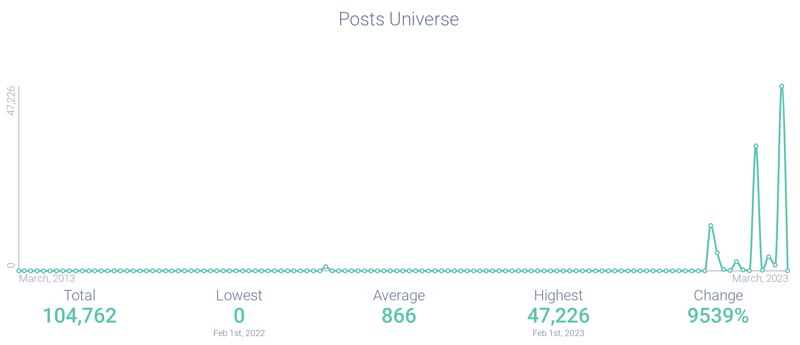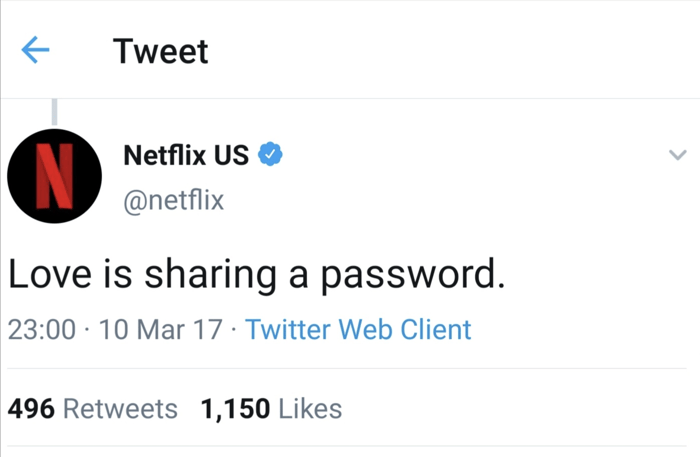Share this
Netflix Password Sharing Crackdown: Impact on Customer Churn and Loyalty
by Henry Chapman on March 15, 2023
Using social listening to understand a big brand’s customer churn
Since pioneering video streaming in 2007, Netflix has transformed the media landscape by giving consumers a vast library of on-demand content without any commercials. However, the company has faced macroeconomic headwinds, such as rising interest rates, new competitors in the space, and a declining stock price. As a result, it has begun taking measures to generate more revenue, most likely under pressure from shareholders. Some of these measures include laying off content-based employees, introducing an ad tier, and – the most notorious of them all – cracking down on password sharing. Here, we focus on the latter to showcase how the drive to generate revenue can wreak havoc on a beloved brand's popularity, and customer loyalty.

Figure 1: Netflix post volume from 2007 through 2023; Infegy Atlas data.
Password sharing during Netflix’s early years
Netflix's lax stance on shared accounts was a leading reason for its growth, allowing people to take Netflix with them as they moved out of their parents' homes or away from old roommates. This helped Netflix to position itself as a brand that cared about its customers and was accessible to everyone. In 2017, Netflix even tweeted “Love is sharing a password,” clearly endorsing the practice of sharing accounts. However, with the company now cracking down on password sharing, the sentiment behind this tweet has been flip-flopped. This tweet did not get much attention when it was originally shared in 2017, but went viral when Netflix first started floating the idea of a crackdown on account sharing.


Figure 2a: Post volume of resurfaced Netflix password sharing tweet; Infegy Atlas data.
Figure 2b: Screenshot of now maligned Netflix password sharing tweet; Infegy Atlas data.
How Netflix plans to implement password sharing
Netflix plans to have users register their devices’ MAC addresses (a unique hardware key associated with a laptop or smartphone) with a home WiFi network. If a client's device doesn't connect to that home network for 30 days, it will not be permitted to access the service. However, this plan has faced criticism, especially from those who don't have regular WiFi networks, such as people in developing countries who often rely on fast/regular cellular coverage. Critics argue that this change will disproportionately affect those who cannot afford or access home WiFi, and could further widen the digital divide.

Figure 3: Word cloud showing topics related to Netflix password sharing; Infegy Atlas data.
Huge surge in post volume and negative sentiment in Latin America
Netflix first previewed this change in Latin America. Infegy Atlas tracked nearly universal negative sentiment around the change, where users complained profusely in Spanish about needing to return to a home WiFi network. Interestingly, the platform detected more post volume around password sharing in countries with lower broadband-access rates, suggesting that people bemoaning the change were those most affected not having a home WiFi network to connect to. This highlights two notable points: the impact of regional differences in internet infrastructure, and how vital it is for brands to value consumer insights such as customers’ digital access and geographic distribution when making policy changes.

Figure 4a: South America showing density of password sharing conversation (darker means more dense conversation; Infegy Atlas data.

Figure 4b: South America showing density of broadband internet connections per capita; Infegy Atlas data.

Figure 4c: South America showing sentiment around Netflix’s password sharing policy; Infegy Atlas data.
Business consequence #1: increased customer churn
This crackdown threatens real financial consequences for Netflix. First, customer churn has been one of the main areas of concern for Netflix: it is relatively easy for consumers to cancel service, and there are plenty of competitors in the video streaming industry. According to Infegy Atlas data, the change is exacerbating an already ongoing problem by making customers more frustrated. This could result in more cancellations and further loss of revenue for Netflix. This is especially troubling as competition in the streaming market heats up, with new players entering the space, and established companies like Disney and Amazon continuing to expand their offerings.

Figure 5: Infegy Atlas Themes show that both customer churn and illegal downloading have increased; Infegy Atlas data.
Business consequence #2: a return to piracy
As customers get more frustrated, they are discussing returning to digital media piracy. This is reflected both in the previous graph, as well as Infegy Atlas Source Interests. The platform has found that conversations around illegal downloading as a crime have surged over 1000% since Netflix released this change. This represents lost revenue for the entire media industry; it could threaten the viability of the streaming model entirely, as the industry relies on customers paying for content rather than downloading it illegally.

Figure 6: Interests around those complaining about Netflix’s password sharing; Infegy Atlas data.
Conclusion
Netflix's crackdown on password sharing was originally intended to generate more revenue. However, it has led to negative sentiment, potential customer churn, and increased volume of conversations on potential piracy.
Business decisions can impact brand reputation and customer loyalty tremendously! Netflix’s case serves as a cautionary tale for brands that may be tempted to compromise their original values and client-centered stances in pursuit of generating more revenue. Therefore, it is in every company’s best interest to acquire robust consumer insights before implementing changes that might be unpopular.
They should also consider regional differences in internet infrastructure and access when making policy changes that could affect their customers. Ultimately, a brand's reputation and customer loyalty are priceless assets that should be protected at all costs.
Netflix's Password Crackdown: Key Takeaways
Netflix is cracking down on password sharing as a way to boost revenue, facing backlash and negative sentiment.
-
Early Stance on Password Sharing
- Initially, Netflix allowed open account sharing, which fueled its growth. Their 2017 tweet endorsing password sharing is now ironic.
-
Implementation and Criticism
-
Netflix requires devices to register with a home WiFi for continued access. This has drawn criticism, especially in areas with limited broadband.
-
-
Backlash in Latin America
- Negative sentiment spiked in Latin America, highlighting inequities in internet access and the need for consumer insight in policy changes.
-
Impact on Customer Retention
- Increased customer churn is a major risk as frustrated users consider cancellations amidst fierce streaming competition.
-
Rise in Digital Piracy
- As dissatisfaction grows, discussions on media piracy have surged, posing threats to the streaming model.
-
Key Takeaways for Brands
- Netflix's case underscores the importance of consumer insights and respecting customer needs to maintain loyalty and reputation.
Share this
- January 2026 (1)
- December 2025 (2)
- November 2025 (2)
- October 2025 (3)
- September 2025 (2)
- August 2025 (2)
- July 2025 (3)
- June 2025 (3)
- May 2025 (4)
- April 2025 (2)
- March 2025 (1)
- February 2025 (4)
- January 2025 (1)
- December 2024 (2)
- November 2024 (2)
- October 2024 (4)
- September 2024 (2)
- August 2024 (2)
- July 2024 (2)
- June 2024 (2)
- May 2024 (2)
- April 2024 (2)
- March 2024 (2)
- February 2024 (2)
- January 2024 (2)
- December 2023 (3)
- November 2023 (3)
- October 2023 (4)
- September 2023 (4)
- August 2023 (4)
- July 2023 (4)
- June 2023 (3)
- May 2023 (5)
- April 2023 (3)
- March 2023 (7)
- February 2023 (3)
- January 2023 (4)
- December 2022 (2)
- November 2022 (3)
- October 2022 (4)
- September 2022 (2)
- August 2022 (3)




.png?width=64&height=64&name=linkedin%20(1).png)